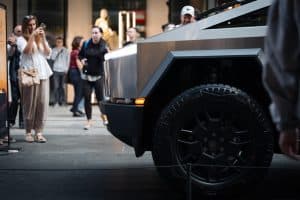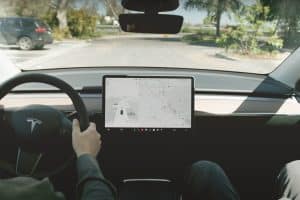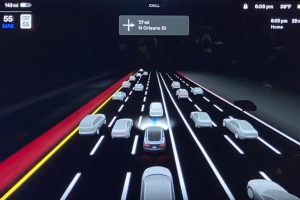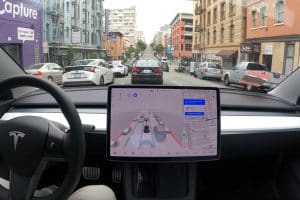Last Friday, November 27, Tesla Chief Engineering Officer Elon Musk tweeted that the rather advanced beta version of Tesla’s Full Self-Driving suite would probably be going out to significantly more owners in ~2 weeks, which would now make that about a week away.
For those of us eagerly waiting for this update to hit their cars (yes, that counts me!), and for people who are just curious about how the firmware is doing, there are actually a lot of videos out there showing what the Full Self-Driving (FSD) suite can and cannot handle. Johnna Crider has shared occasional updates and interviews with early beta testers who are popular on Twitter, but there are a large variety of them on YouTube that we haven’t shared. I thought I’d share several of them in this article, but it turned out that covering just a couple of them was a full article, so this may end up being more of a series.
One thing I wanted to highlight before exploring FSD’s current capabilities and challenges, though, is an important comment Elon recently made in an interview accepting his new Axel Springer award. He noted in the interview that he expects Tesla FSD to be at “Level 5” full autonomous driving capability next year. That means a system that requires absolutely no intervention that you could basically sleep in or watch a movie in as it drives. He said he was “extremely confident of achieving full autonomy and releasing it to the Tesla customer base next year.” Naturally, many people are skeptical of this, but it has typically been good advice to not bet against Elon, as our friend and close Tesla follower Steve Hamel points out every day. That said, the one thing Elon hasn’t been the best at is certain timeline estimates, and achieving full autonomy is a particularly challenging problem. We shall see.
For now, below is a great video showing how the FSD beta handles certain difficult (and not so difficult) driving situations today.
Can Avoid Deer, & Can Drive At Night Without Headlights
Numerous Challenging Situations — How Does Tesla Full Self-Driving Do?
Timestamped links for notable segments of the video:
- 2:40: moved over on narrow dirt road without lane markings for oncoming car.
- 4:33: struggled with a challenging 3-way stop following a quick hook and worn out lane markings.
- 6:27: handled another 3-way stop with better markings and a less difficult approach much better.
- 5:23: got confused after a left-hand turn onto a narrow road without lane markings and something that apparently made it stop.
- 5:55: started driving toward a construction cone in the road on a right turn, then stopped and paused briefly before continuing the correct way.
- 6:47: handled left turn with no turn lane, no light, no signs, and oncoming traffic superbly — also nicely handles getting around cars parked on the street right after that.
- 7:47: appropriately waited for oncoming cars to go first at a green light where the car needed to turn left but didn’t have a turn signal — even though the cars on the other side of the intersection were delayed going on green; unfortunately, being a little bit more cautious than needed and not inching into the intersection right before or during yellow, the car missed its chance to turn on that round of green lights.
- 10:07: at an intersection where the light was out, the car should have treated it like a stop sign, but it did not and tried to follow the car in front through the intersection, forcing the driver to intercede.
- 11:40: again at intersection where the light was out, but car needed to turn left — car either couldn’t handle it or paused for too long, causing the driver to take over and drive through the intersection on his own.
- 12:20: goes through blinking yellow light fine; “it’s been getting better and better at those.”
- 12:33: able to go through harder and harder roundabouts.
- 16:30: barely made it through a very difficult navigation challenge — had to turn right on a fast-moving road and quickly cross three lanes to get into the left-turn lane to enter a large parking lot; and it made it through, but a bit slower than ideal and it probably wouldn’t have made it across (at least not in a natural, safe way) if there was a lot of traffic at the moment.
Here’s a more recent update from the same person, which includes a number of interesting notes but not nearly as many interesting or challenging intersections as the ones highlighted above:
In general, the biggest problem is just that the car takes some maneuvers a bit too slowly, somewhat too cautiously in a counterproductive way. To be honest, this is an area that it seems to me must be extremely hard to “get right” due to a combination of different needs in slightly different scenarios and different driving styles — including even different driving cultures in different cities or regions. However, Tesla is rapidly improving the firmware and each update brings noticeable steps forward according to every reviewer I’ve seen commenting on it.
As the reviewer above notes at the end of that last video, it is similar to how automatic lane change evolved. Initially, it was a fun gimmick but not very natural and prone to “buggy” behavior. After a few months, it had clearly improved. After 6 months, it had improved a great deal. I typically use it when I need to change lanes because it’s seamless, it’s fast, and I know the car has tremendous visibility and will only change lanes if the lane I’m moving into is clear. It does have a few remaining issues in certain scenarios — for example, if it starts changing lanes but then the broken white lane marking turns into a solid white lane marking (indicating you can’t change lanes), it will reverse course and try to go back to the original lane. Perhaps that is improved with the FSD beta update, though — I’m eager to find out once I finally get into the beta program!
We’ll see in time how much FSD improves in the coming months in the challenging scenarios it struggled with in the videos above, as well as many others, but my bet would be that it is dramatically smoother and more human-like in 6 months.
Original Publication by Zachary Shahan at CleanTechnica.
Want to buy a Tesla Model 3, Model Y, Model S, or Model X? Feel free to use my referral code to get some free Supercharging miles with your purchase: http://ts.la/guanyu3423
You can also get a $100 discount on Tesla Solar with that code. Let’s help accelerate the advent of a sustainable future.





